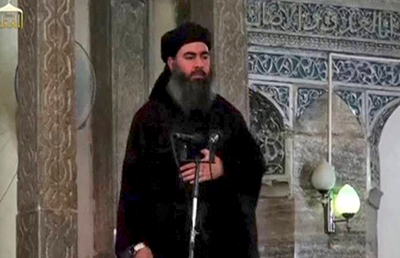Baghdad, Oct 4: The IS terrorist group ringleader was reportedly seriously ill after having his food poisoned by an assassin, a media report said.
 Meals prepared for Baghdadi and three other commanders of the terrorist organisation were allegedly poisoned in Nineveh's Be'aaj district, the Daily Mail reported on Monday.
Meals prepared for Baghdadi and three other commanders of the terrorist organisation were allegedly poisoned in Nineveh's Be'aaj district, the Daily Mail reported on Monday.
It quoted an Iraqi news agency as saying that four militants, including Baghdadi, were suffering from “severe poisoning” and “have been transferred to an unknown location under strict measures”.
The IS terror group has reportedly launched a campaign of arrests to track down those responsible for poisoning the food.
The identities of the three other commanders is unknown.
Baghdadi is credited with transforming the breakaway al-Qaeda group and turning it into the independent IS group that is arguably the most powerful and wealthiest jihadi organisation in the world.
Al-Baghdadi's movements are known only by his inner circle, and the Caliph, as he is known to his followers, is constantly on the move, changing locations in Iraq and Syria to avoid airstrikes.
Under the leadership of Baghdadi, the group spearheaded a militant offensive that expanded into Syria in 2013 and overran much of Iraq's Arab heartland.
Baghdadi has been wounded multiple times in air strikes and been reported dead, but has re-surfaced each time.
Earlier this year, there were reports he had been killed by US-led coalition air strikes, but they turned out to be inaccurate, the Daily Mail reported.
Baghdadi — whose real name is Ibrahim Awad Ibrahim — is thought to have been born in Samarra, north of Baghdad, in 1971.
In October 2011, the US officially designated Baghdadi as “terrorist” and offered a $10 million reward for information leading to his capture or death.
Under Baghdadi's leadership, IS militants have shocked the world with their sadistic beheadings of captured foreign journalists and civilians.





Comments
Add new comment